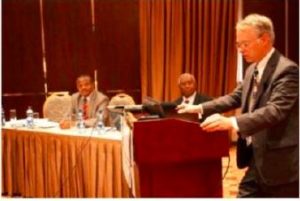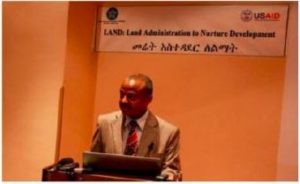
In 2005 Ato Sileshi Getahun began his relationship with USAID while attending a capacity building training conducted by the USAID Land Tenure and Property Rights Division. Eight years later Ato Getahun is serving as the Minister of Agriculture of Ethiopia, where he continues to work with USAID to successfully lead Ethiopia’s land tenure and property rights reforms through the Land Administration to Nurture Development (LAND) Project. The LAND project is the third consecutive project aimed at improving land governance in rural Ethiopia, demonstrating the continuity and sustainability of USAID’s programming. The project leverages capacity built under previous interventions in Ethiopia’s highlands that helped strengthen land tenure security for men and women, improve service delivery, and certify rural land rights and encourage efficient land transactions to develop procedures to certify community rights to communal land in pastoral areas.

Minister Getahun expressed the government’s appreciation for USAID’s support and acknowledged the role USAID continues to play in bringing positive reforms to the country’s land tenure and property rights sector, allowing the country to reach a range of development objectives that will elevate Ethiopia from a low to a middle-income country by 2025. LAND will serve as the next iteration to assist Ethiopia in meeting its development goals. Certification of community land rights is on the cutting edge of LTPRinterventions globally and will support Ethiopia to achieve greater food security, improved livelihoods for the rural poor, and development objectives outlined in the country’s Growth and Transformation Plan (GTP).
The Minister reaffirmed the government’s commitment to LAND’s objectives and expressed his confidence that the project will be able to successfully continue strengthening property rights and improving rural land governance across Ethiopia. He further instructed regional officials to work with the project to address the challenges that lie ahead, including securing communal boundaries, developing strong land use plans that will lead to more productive and sustainable landscapes, increasing agricultural production, linking communities to markets, improving livelihoods, and fueling economic growth.

